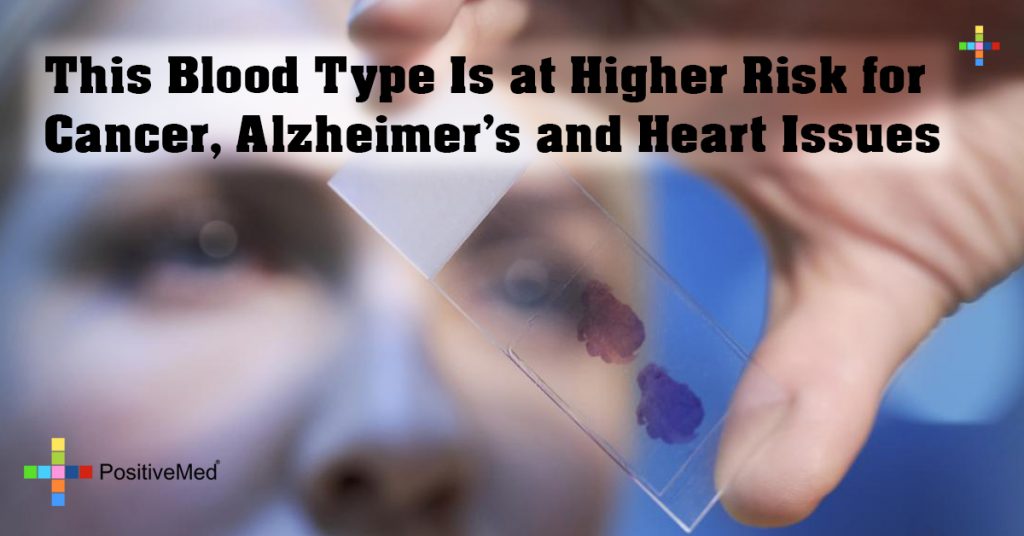
This Blood Type Is at Higher Risk for Cancer, Alzheimer’s and Heart Issues
[nextpage title=”…”]
Were you aware that your blood type not only determines to who and from whom we can receive blood, but can also point to certain personal health patterns? Studies have shown, for instance, that the AB blood type is at higher risk for cancer, Alzheimer’s and heart issues. Knowing your risk factors can help you to take a more proactive role in maintaining your health and preventing the onset of certain health challenges.

Studies Uncover AB Blood Type RisksA study conducted in 2014 at the University of Vermont was able to uncover evidence that persons with type AB blood had a higher risk of cognitive impairment. Though the study’s main focus was on the risk of Alzheimer’s and Dementia, other tendencies in type AB blood were also spotted due to the tendency for type AB blood to a protein that assists in clotting that tends to contribute to a higher risk of heart issues; a study that was confirmed by a 2012 study at Harvard.
Tracking health risks via blood type is a decades old pursuit. A third study in 2009 at Harvard School of Medicine also uncovered a connection between the higher concentration of glycoproteins (sugars) that are attached to the AB blood type and a higher risk for the development of cancer, especially pancreatic and colorectal cancer.
Let’s take a closer look at each of the three risks and how they might be prevented.
Alzheimer’s RiskOne of the main causes of Alzheimer’s is the onset of cognitive impairment. The Vermont Study “found that people with AB blood were 82 percent more likely to develop the thinking and memory problems that can lead to dementia than people with other blood types.” (Nachbur, 2014) Specifically, the study found that ABs had a greater tendency that other blood types to have issues with learning or recalling lists of items, which is standard cognitive performance test.
The higher risk is related to a higher concentration of a clotting factor known as Factor VIII. Factor VIII is a contributor to numerous vascular issues, one of which is a higher probability of cognitive impairment, especially as a person ages. Those vascular issues are not just limited to memory issues, they also contribute to heart issues.
Heart Issues RiskThe vascular issues we listed above were confirmed in a 2012 study at Harvard. “Pooling data from two long-running research studies that tracked 89,500 adults over 20 years, the researchers found that people with blood type AB were 23% more likely to develop heart disease than others.” (Harvard University, 2012)
RELATED ARTICLE: So, What’s So Unique About Type O Blood?
[/nextpage] [nextpage title=”…”]
Evidence suggests that besides the higher concentration of Factor VIII, there is an association with higher levels of low-density lipoprotein cholesterol, which tends to clog arteries. Those with AB blood type also have an increased tendency toward inflammation, which can also affect the function of the blood vessels, contributing to a higher risk of heart issues.
Cancer RiskIf Alzheimer’s and heart issues weren’t enough, the risk of cancer is also higher for persons who have the AB blood type. A 2009 study of blood types at Harvard “demonstrates that while people’s overall risk of pancreatic cancer is relatively low — with nearly 40,000 new cases diagnosed annually in the United States, compared with nearly 150,000 new cases of colorectal cancer — people with blood types A, B, or AB were more likely to develop the disease than those with type O.” (Harvard University, 2009)
Though the study showed that blood type B held a 20% higher risk for the development of cancer, the fact that the Abs still indicated a 51% risk for cancer development is little consolation. Ironically enough, it is the higher concentration of the sugar that helps determine blood types that is seen as the contributing factor to this higher cancer risk.
Risk PreventionSince there are numerous studies to support that type AB blood is at higher risk for cancer, Alzheimer’s and heart issues, how are you to prevent the inevitable onset of these risks? There are actions that you can take to reduce these risks:
• exercise
• blood type dieting• avoiding head injury
• mental activities and challenges
Because studies have shown that the AB blood type is at higher risk for cancer, Alzheimer’s and heart issues it helps you to become aware of what risks you run and how you might defend against those risks as you age. Genetics control your blood type, but you can control your behaviors by doing what is necessary to protect yourself and your health.
This is what your blood type means for your risk of cancer, heart disease and Alzheimer’s.[/nextpage]








